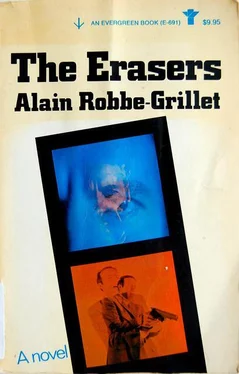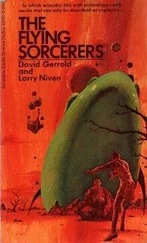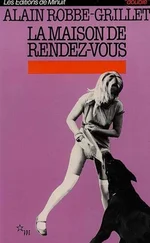Alain Robbe-Grillet - The Erasers
Здесь есть возможность читать онлайн «Alain Robbe-Grillet - The Erasers» весь текст электронной книги совершенно бесплатно (целиком полную версию без сокращений). В некоторых случаях можно слушать аудио, скачать через торрент в формате fb2 и присутствует краткое содержание. Жанр: Криминальный детектив, на английском языке. Описание произведения, (предисловие) а так же отзывы посетителей доступны на портале библиотеки ЛибКат.
- Название:The Erasers
- Автор:
- Жанр:
- Год:неизвестен
- ISBN:нет данных
- Рейтинг книги:4 / 5. Голосов: 1
-
Избранное:Добавить в избранное
- Отзывы:
-
Ваша оценка:
- 80
- 1
- 2
- 3
- 4
- 5
The Erasers: краткое содержание, описание и аннотация
Предлагаем к чтению аннотацию, описание, краткое содержание или предисловие (зависит от того, что написал сам автор книги «The Erasers»). Если вы не нашли необходимую информацию о книге — напишите в комментариях, мы постараемся отыскать её.
The Erasers — читать онлайн бесплатно полную книгу (весь текст) целиком
Ниже представлен текст книги, разбитый по страницам. Система сохранения места последней прочитанной страницы, позволяет с удобством читать онлайн бесплатно книгу «The Erasers», без необходимости каждый раз заново искать на чём Вы остановились. Поставьте закладку, и сможете в любой момент перейти на страницу, на которой закончили чтение.
Интервал:
Закладка:
The little man in the long greenish coat who has been leaning over the parapet straightens up.
CHAPTER FIVE
1
And night is already falling-and the cold fog comes in from the North Sea; the city seems to fall asleep in it. There has been almost no day at all.
Walking along past the shopwindows that light up one after the other, Wallas tries to distinguish the usable elements of the report Laurent has given him to read. That the motive of the crime is not theft, he is-in the precise sense of the words-“paid to find out.” But why go so far as to imagine this duplication of the murderer? It does not take anyone any further to have supposed that the man who fired the fatal shot is not the man who pointed out the familiar way across the garden and through the house. Moreover, the argument about the footsteps on the lawn is not very convincing. If someone were already walking on the brick rim of the path, the other man could have walked behind him or rather in front of him, since he was the only one supposed to know the way. This is the position it is easiest to imagine the two night prowlers adopting. In any case, no one needed to walk on the lawn; if anyone did, it must be for some other reason-or else for no reason at all.
Wallas feels the day’s accumulated fatigue beginning to make his legs numb. He is not used to walking such long distances. These comings and goings from one end of the town to the other must ultimately add up to a good number of miles, most of which he has covered on foot. Leaving the police station, he headed for the Rue de Corinthe by way of the Rue de la Charte, the prefecture, and the Rue Bergere; here he found himself at an intersection of three roads: the one he was on and two possible directions opposite him, forming a right angle between them. He remembered having already passed this place twice before: the first time he had gone the right way, the second time he had made a mistake; but he could no longer remember which of these two streets he had taken the first time-moreover, they looked very much alike.
He took the one to the left, and after a few detours made necessary by the arrangement of sidewalks, he came out-much sooner than he would have believed possible-on the courthouse square, just in front of the police station.
Laurent was just leaving; he has indicated his surprise at finding Wallas here, since he had left some fifteen minutes ago. Yet Laurent has not asked for any explanation and has offered to drive the special agent to Juard’s clinic in his own car, for he was going that way himself.
Two minutes later, Wallas was ringing at Number 11. It is the same nurse who has opened the door before-the one who, this morning, had insisted so indiscreetly on keeping him there despite the doctor’s absence. He could tell from her smile that she recognized him. “They’re all the same!” He has told her he wanted to speak to Doctor Juard in person; he has emphasized the urgent nature of his visit and has given her a card on which were printed the words: “Bureau of Investigation of the Ministry of the Interior.”
He has been asked to wait in a kind of dim parlor-library. Since no one has asked him to sit down, he has walked up and down in front of the shelves filled with books, now and then reading a few titles as he passed. One whole shelf was filled with books devoted to the plague-as many historical studies as medical ones.
A woman has walked through the room, then two others and a short, thin man wearing glasses, who seemed in a great hurry.
The nurse has finally come back and-as if she had forgotten him-asked him what he was waiting for. He has answered that he was waiting for Doctor Juard.
“But the doctor left a moment ago, didn’t you see him just now?”
It was hard to believe that she was not making fun of him. How could he have guessed that the man he has just seen was Doctor Juard, since he did not know him. And why hadn’t she announced his visit as he had asked her to?
“Don’t be angry, Monsieur; I thought the doctor would have spoken to you before he went out. I had told him you were here. He’s just been called on an emergency case, and it was impossible for him to stay-even a minute. Since the doctor has a very busy afternoon, he’s asked if you could meet him at exactly four-thirty in the hall of the railway station, between the telephone booths and the snack bar; it’s the only way you can meet him today: he won’t be coming back here until late tonight. When I saw the doctor come in here, I assumed he was going to arrange the meeting himself.”
On his way through the room, the little doctor had glanced at him out of the corner of his eye. “There are some funny doctors around here.”
Since he had plenty of time, Wallas went around to Marchat’s apartment building. But his ring at the door remained unanswered. That wasn’t important, one way or the other, Laurent having repeated to him the essentials of his conversation with the man who believed himself doomed to die. Still, he would have liked to judge the man’s mental equilibrium for himself. Laurent described him as raving mad, and the way he had behaved in the commissioner’s office justified, at least in part, this opinion. But on certain points, Wallas is not so sure as the commissioner of the insanity of Marchat’s fears: the execution of a new victim is in fact only too likely for this very evening.
Having walked back downstairs, Wallas has asked the concierge of the building if he knew when his tenant would be coming in. Monsieur Marchat had just left in his car for several days, with his entire family; he had probably heard of the death of a close relative: “The poor fellow was all worked up.”
The businessman lives in the southern part of town, not far from the wood export offices. From here, Wallas proceeded toward the station, walking back along the Rue de Berlin and through the courthouse square. He then followed an endless canal bordered on the other side by a row of old houses whose narrow gables have been rotted away by the water for centuries, until they lean over the canal most alarmingly.
Walking into the station hall, he saw the little chromium-plated stand at once, where a man in a white apron was selling sandwiches and bottles of soda pop. About five yards to the right there was a telephone booth-just one. He began walking up and down, glancing frequently at the dial of the clock. The doctor was late.
The hall was full of people hurrying in all directions. Wallas did not budge an inch from the place indicated by the nurse, for the crowd was so thick that he was afraid he might miss the doctor when he arrived.
Wallas began to be worried. The hour agreed on had long since passed and the disagreeable impression his visit to the clinic had made on him was growing stronger minute by minute. There had certainly been a misunderstanding. The nurse had garbled the message, either in understanding or transmitting it-perhaps in both.
He would have to telephone to the clinic to ask for an explanation. Since there was no phone book in the one booth standing here, Wallas has asked the man behind the soda fountain where he might find one. While handing out bottles and counting change, the man indicated a place in the hall where Wallas, despite his efforts, could see nothing but a newsstand. It seemed to him that the boy had not understood what he wanted. He has nevertheless started toward the tiny stall where there was obviously no trace of a phone book. A few stationery articles were exhibited among the illustrated magazines and the brightly colored covers of the detective stories; Wallas has asked to see some erasers.
It was at this moment that Doctor Juard appeared. He had been waiting at the other end of the hall, where the real snack bar and a whole row of telephone booths are.
Читать дальшеИнтервал:
Закладка:
Похожие книги на «The Erasers»
Представляем Вашему вниманию похожие книги на «The Erasers» списком для выбора. Мы отобрали схожую по названию и смыслу литературу в надежде предоставить читателям больше вариантов отыскать новые, интересные, ещё непрочитанные произведения.
Обсуждение, отзывы о книге «The Erasers» и просто собственные мнения читателей. Оставьте ваши комментарии, напишите, что Вы думаете о произведении, его смысле или главных героях. Укажите что конкретно понравилось, а что нет, и почему Вы так считаете.












